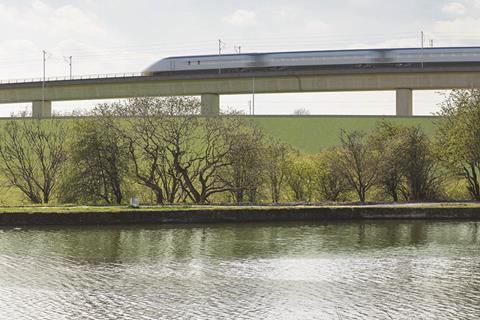Transport secretary commits to more infrastructure investment in biggest shake-up since privatisation
Great British Railways, a state-owned body that will set timetables and prices, sell tickets in England and manage all infrastructure, has been announced in the biggest shake-up of the UK's railways since privatisation in the mid-1990s.

Transport secretary Grant Shapps said the new system would continue to expand the country's railway infrastructure.
"We will grow, not shrink, the network, continuing to invest tens of billions of pounds in new lines, trains, services and electrification," he said.
GBR will come into effect in 2023 and replace Network Rail as manager of rail infrastructure in the UK.
The Williams-Shapps plan, which has been based on the independent recommendations of Keith Williams, reiterated that the spending review in November 2020 committed more than £40bn for rail capital projects over the next four years.
This includes £22.8bn for HS2 to 2025 and a further £17.5bn in capital funding for renewals, upgrades and enhancements of the existing network up to 2024.
The plan said that these sums would be maintained, and that the government would continue to provide five-year funding settlements for rail infrastructure during and following the implementation of the reforms set out in this white paper
Shapps said the aim was to offer more punctual services and cheaper tickets, but added that private operators would still be contracted to run most trains.
The plan has been cautiously welcomed by industry figures. Tim Wood, Transport for the North’s interim chief executive, warned that the plan must not come at the cost of devolution that should see regional leaders have greater oversight of regional infrastructure investment.
He said: “The commitment to growing and investing in the railway over the next 30 years only emphasises the real need for the government to publish the Integrated Rail Plan for the North and Midlands without delay, to give us much-needed certainty on delivery of major schemes like Northern Powerhouse Rail, HS2 and the Transpennine Route Upgrade.
“As an established and effective partnership in the North of England, Transport for the North will collaboratively engage with government as it begins to work through the detail and we stand ready to drive positive change in the interest of our passengers.”
Alasdair Reisner, chief executive of the Civil Engineering Contractors Association, backed the reforms saying they represent a new dawn for the rail sector. He said: "We welcome the creation of simplified structures of decision-making that will do much to end adversarial practices between organisations working on the UK's rail infrastructure."
The Integrated Rail Plan, which was due to be published within three months of November's spending review, is set to lay out the government's priorities for rail infrastructure plan in the North and Midlands.
The government has not confirmed when it will be published.
Goals of the Williams-Shapps plan:
- A modern passenger experience
- A retail revolution
- New ways of working with the private sector
- Economic recovery and financial sustainable railways
- Greater control for local people and places
- Cleaner, greener railways
- Bold, new opportunities for rail freight
- Increased speed of delivery and efficient enhancements
- Skilled, innovative workforce
- A simpler industry structure


























No comments yet